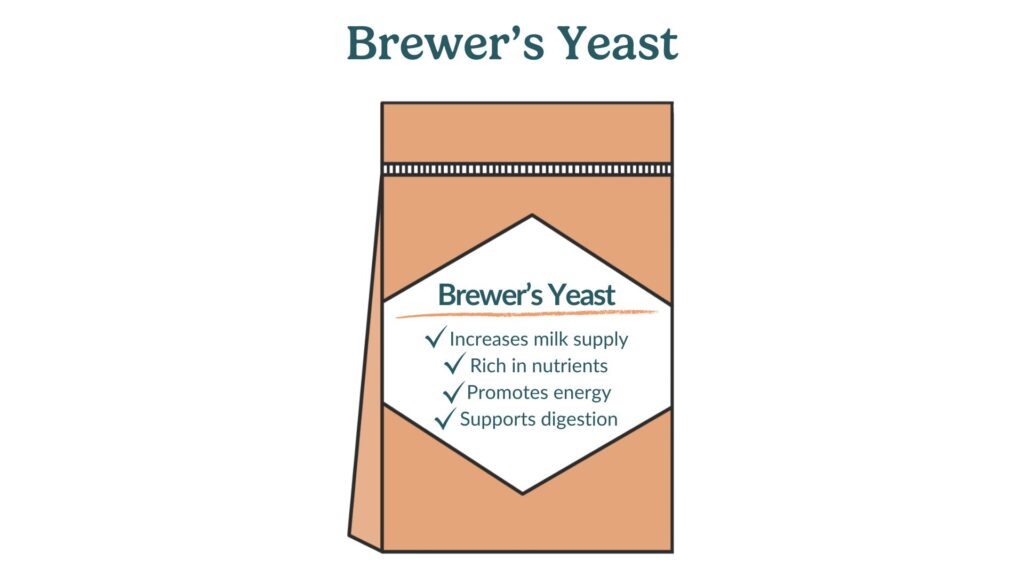brewer’s yeast

Brewer's yeast
Brewer's yeast is a type of yeast that is often used as a nutritional supplement. It is rich in B vitamins, protein, and minerals, and is sometimes used to support breastfeeding mamas. Brewer's yeast is believed to help increase milk supply, although scientific evidence on its effectiveness is limited.
What to watch out for
It’s important to recognize the potential benefits of brewer's yeast and understand how to use it correctly. Here are some considerations and tips:
Benefits
- Increases milk supply: Many breastfeeding mamas report that brewer's yeast helps boost their milk production and milk let-down.
- Rich in nutrients: Contains B vitamins, protein, iron, selenium, and chromium, which can support overall health and energy levels.
- Promotes energy: The B vitamins in brewer's yeast can help improve energy levels and reduce fatigue.
- Supports digestion: Brewer's yeast can help maintain a healthy digestive system.
Tips for using brewer's yeast
- Consult a healthcare provider: Before adding brewer's yeast to your diet, consult your healthcare provider to ensure it’s safe for you and your baby.
- Start with small amounts: Begin with a small amount to see how your body reacts, and gradually increase the dosage if needed.
- Incorporate into food: Brewer's yeast can be added to foods such as smoothies, yogurt, oatmeal, or baked goods.
- Monitor for side effects: Watch for any adverse reactions, such as digestive upset or allergic reactions, and discontinue use if necessary.
Common ways to use brewer's yeast
- Smoothies: Add a tablespoon of brewer's yeast to your favorite smoothie recipe.
- Baked goods: Incorporate brewer's yeast into recipes for lactation cookies, muffins, or bread.
- Sprinkle on food: Sprinkle brewer's yeast on top of yogurt, oatmeal, or salads.
- Supplements: Brewer's yeast is also available in tablet or capsule form for convenient use.
Precautions
- Allergic reactions: Some individuals may be allergic to brewer's yeast. If you experience symptoms such as itching, swelling, or difficulty breathing, discontinue use and seek medical attention.
- Digestive upset: Brewer's yeast can cause digestive issues such as gas or bloating in some people. Start with a small amount to see how your body reacts.
- Consult your healthcare provider: Always consult your healthcare provider before adding any new supplement to your diet, especially if you are breastfeeding or have any underlying health conditions.
Physical limitations or health circumstances
Certain conditions can influence the use of brewer's yeast:
- Yeast infections: If you are prone to yeast infections, consult your healthcare provider before using brewer's yeast, as it may exacerbate the condition.
- Diabetes: Brewer's yeast contains chromium, which can affect blood sugar levels. If you have diabetes, monitor your blood sugar levels closely and consult your healthcare provider.
- Allergies: If you have a known allergy to yeast or yeast-containing products, avoid using brewer's yeast.
If you experience any of these conditions, working closely with a healthcare provider can help you use brewer’s yeast safely and effectively.
Other terms
Understanding related terms can help you better manage your breastfeeding and nutritional experience with the support of brewer's yeast:
- Lactation: The process of producing and secreting milk from the breasts.
- Galactagogue: A substance that promotes lactation. Brewer's yeast is often considered a natural galactagogue.
- Lactation consultant: A professional who provides support and guidance on breastfeeding, helping to address challenges like low milk supply.
- Nutritional supplement: A product taken orally that contains nutrients intended to supplement the diet.
- B vitamins: A group of essential nutrients that play a role in energy production and overall health.


